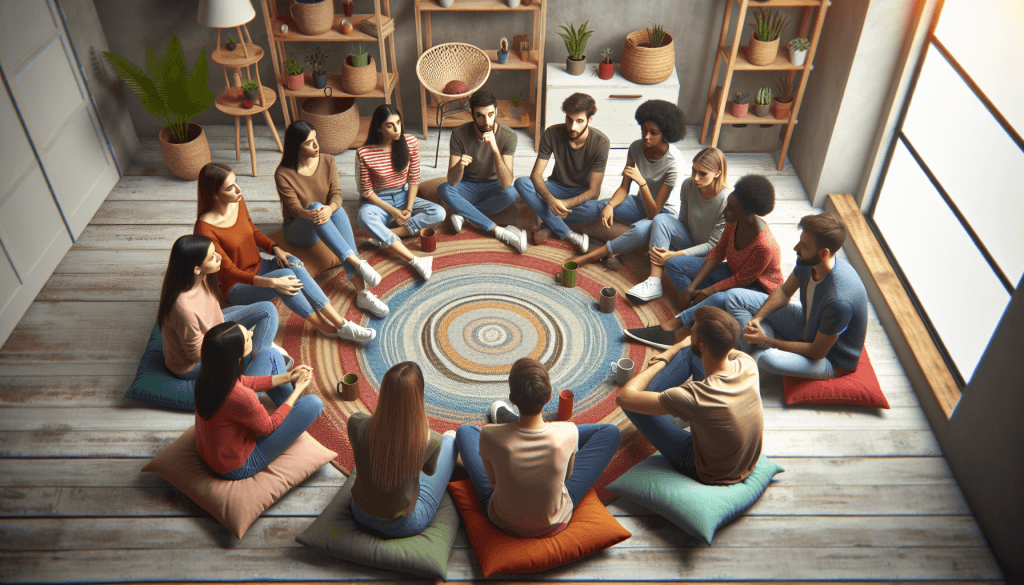Handling conflicts in friend groups can feel like walking a tightrope. One wrong step, and things might spiral out of control. But here’s the good news: conflicts don’t have to be the end of the world—or your friendships. In fact, when handled well, they can strengthen bonds and deepen understanding. So, how do you approach these tricky situations without making them worse? Let’s dive in.
Key Takeaways
- Conflicts are normal in any relationship, including friendships.
- Preparation and emotional regulation are key to resolving disagreements.
- Effective communication can prevent misunderstandings from escalating.
- Conflict resolution can lead to stronger, healthier friendships.
- Preventative measures like setting boundaries help avoid future issues.
Understanding Conflict in Friend Groups
The Nature of Conflicts in Friendships
Friendships, like any relationship, are built on shared experiences, trust, and mutual respect. But they’re not immune to disagreements.
Conflicts often arise because people are different—different opinions, values, or ways of handling situations. And that’s okay! It’s part of what makes friendships dynamic and interesting.
Common Causes of Conflicts in Friend Groups
Miscommunication is a big culprit. A misunderstood text or a poorly timed joke can snowball into a full-blown argument.
Other common triggers include jealousy, feeling left out, or clashing personalities. Sometimes, it’s as simple as someone having a bad day and taking it out on others.
The Importance of Addressing Conflicts
Ignoring conflicts is like sweeping dirt under a rug—it might look clean for a while, but eventually, it piles up. Addressing issues head-on prevents resentment from festering and keeps friendships healthy.

Preparing to Address Conflict
Normalizing Conflict as a Natural Part of Relationships
First things first: conflict is normal. It doesn’t mean your friendship is doomed. In fact, it’s a sign that you care enough to be affected by each other’s actions.
Calming Your Emotions Before Engaging
Before diving into a conversation, take a moment to cool off. Heated emotions can cloud your judgment and make things worse.
Techniques for Emotional Regulation
Try deep breathing, journaling, or even taking a walk. These simple actions can help you process your feelings and approach the situation calmly.
If you’re struggling to manage your emotions, check out these tips for emotional regulation during conflicts.
The Role of Self-Awareness in Conflict Resolution
Understanding your own triggers and reactions is crucial. Are you upset because of what they did, or is it tied to something deeper? Self-awareness helps you respond thoughtfully instead of reacting impulsively.
Preparing for a Constructive Conversation
Think about what you want to say and how to say it. Avoid blaming language and focus on expressing your feelings.

Effective Communication During Conflict
Taking All Perspectives Seriously
Everyone’s feelings are valid, even if you don’t agree with them. Listening to understand, rather than to respond, is key.
Practicing Active Listening
Active listening means giving your full attention, nodding, and paraphrasing what the other person says. It shows you’re genuinely trying to understand their point of view.
Avoiding Assumptions and Biases
Don’t jump to conclusions about someone’s intentions. Ask questions instead of making accusations.
Managing Your Reactions
How you respond can either de-escalate or escalate the situation.
Staying Calm and Composed
Take a deep breath before replying. If you feel yourself getting worked up, it’s okay to pause the conversation and revisit it later.
Avoiding Defensive or Aggressive Responses
Defensiveness can make the other person feel unheard, while aggression can escalate tensions. Aim for a balanced, respectful tone.
Using “I” Statements to Express Feelings
Instead of saying, “You always ignore me,” try, “I feel hurt when I’m left out of plans.” This shifts the focus to your feelings rather than blaming the other person.

Resolving the Conflict
Finding Common Ground
Look for areas where you both agree. This can serve as a foundation for resolving the issue.
Collaborating on Solutions
Work together to find a solution that works for everyone. Be open to compromise—it’s not about “winning” but finding a way forward.
Creating Growth Opportunities for the Group
Learning from the Conflict
Every disagreement is a chance to learn more about each other. What can you do differently next time?
Strengthening the Friendship Through Resolution
Resolving conflicts can actually bring you closer. It shows that your friendship is strong enough to withstand challenges.

Preventing Future Conflicts
Building Open and Honest Communication Habits
Regularly check in with your friends. Open communication can prevent misunderstandings before they happen.
For more on maintaining strong friendships, check out these strategies for building healthy relationships.
Understanding the Impact of Attachment Styles on Friendships
Your attachment style can influence how you handle conflicts. Knowing this about yourself—and your friends—can improve how you interact.
Setting Boundaries and Respecting Them
Boundaries are essential for healthy friendships. They help everyone feel respected and valued. Learn more about setting and maintaining healthy boundaries.
Encouraging Mutual Respect and Empathy
Treat your friends the way you want to be treated. A little empathy goes a long way in preventing conflicts.
The Positive Side of Conflict in Friendships
How Conflict Can Lead to Personal and Group Growth
Conflict isn’t just a problem—it’s an opportunity. It can help you grow as a person and as a group.
Strengthening Bonds Through Overcoming Challenges
Overcoming challenges together can make your friendships stronger. It’s like weathering a storm and coming out the other side.
Developing Deeper Understanding and Trust
When you resolve conflicts, you build trust. Your friends know they can count on you to work through tough times.
Conflicts in friend groups might feel uncomfortable, but they’re not the end of the road. With patience, empathy, and good communication, you can turn disagreements into opportunities for growth.
For more tips on handling tricky situations, check out this guide on managing emotions during conflict.
Friendships are worth the effort. So, take a deep breath, have that conversation, and watch your bonds grow stronger than ever.
FAQ: Navigating Conflicts in Friend Groups with Ease and Understanding
Why do conflicts arise in friend groups?
Conflicts often arise due to differences in opinions, misunderstandings, or unmet expectations. In close-knit groups, emotions can run high, and small issues may escalate if not addressed early. Recognizing the root cause is key to resolving disputes effectively.
How can I address a conflict without making it worse?
Approach the situation calmly and with empathy. Choose a neutral time and place to discuss the issue, and focus on expressing your feelings rather than blaming others. Active listening and open communication can help de-escalate tensions.
What should I do if I feel caught in the middle of a conflict between friends?
Avoid taking sides and instead encourage open dialogue between the conflicting parties. Offer support by being a mediator if appropriate, but set boundaries to protect your own emotional well-being.
How can I prevent conflicts from recurring in my friend group?
Establish clear communication and mutual respect within the group. Encourage everyone to express their feelings openly and address small issues before they grow. Building trust and understanding can help prevent future conflicts.
What if someone in the group refuses to resolve the conflict?
Respect their choice but focus on maintaining a positive relationship with the rest of the group. Sometimes, giving the person space and time can help them come around. If necessary, seek external support or advice to navigate the situation.
How do I handle conflicts involving sensitive topics?
Approach sensitive topics with care and empathy. Avoid making assumptions and listen actively to understand different perspectives. Acknowledge feelings and work together to find a resolution that respects everyone’s boundaries.
Should I involve the entire group in resolving a conflict?
It depends on the nature of the conflict. For personal disputes, it’s better to address the issue privately. However, if the conflict affects the entire group, a group discussion can help ensure everyone’s voice is heard and a collective solution is reached.
What role does forgiveness play in resolving conflicts?
Forgiveness is crucial for moving past conflicts and rebuilding trust. It doesn’t mean forgetting the issue but rather letting go of resentment. Forgiveness allows the group to heal and strengthens the bond among friends.
How can I stay neutral during a heated argument in the group?
Focus on understanding both sides without taking a stance. Encourage calm and constructive communication, and remind everyone of the value of the friendship. Staying neutral helps maintain balance and prevents further escalation.
When is it time to walk away from a friend group due to conflicts?
If conflicts persist despite efforts to resolve them or if the group dynamic becomes toxic, it may be time to reassess the friendship. Prioritize your mental health and seek relationships that bring positivity and support into your life.



